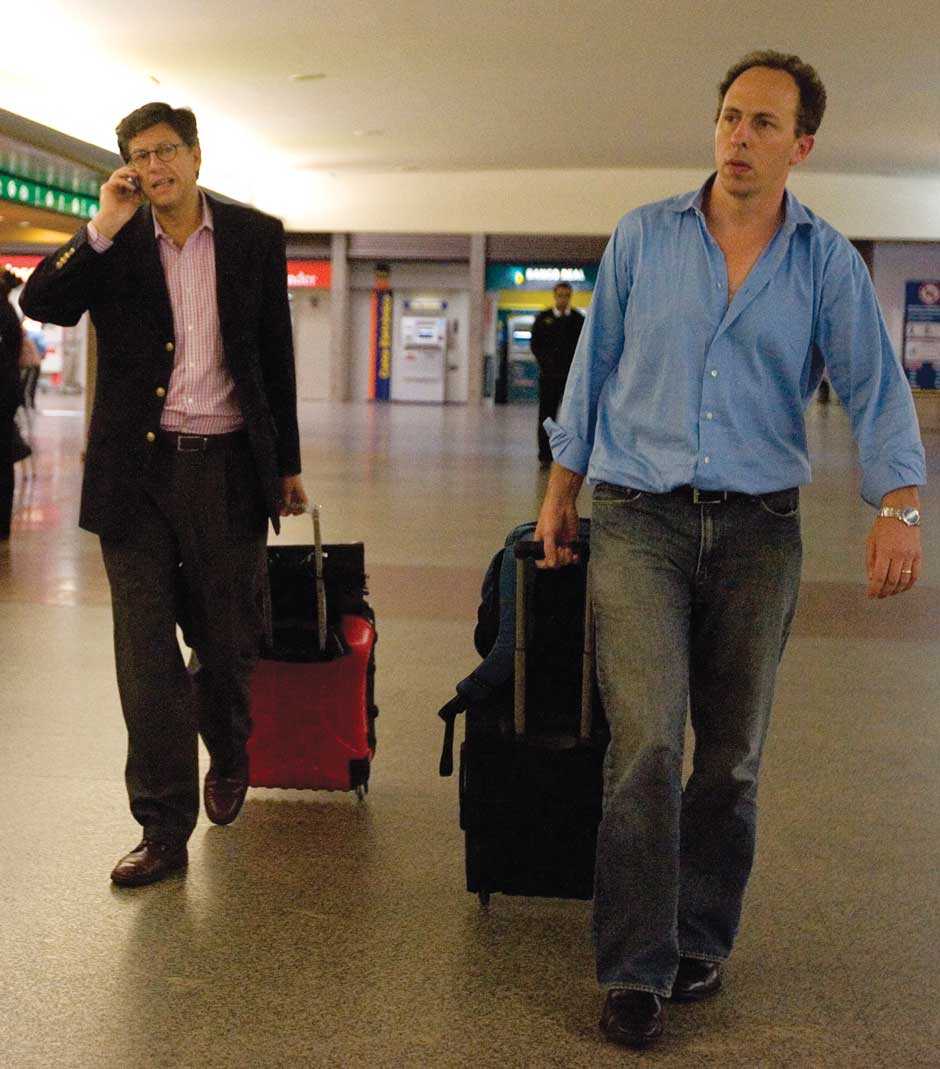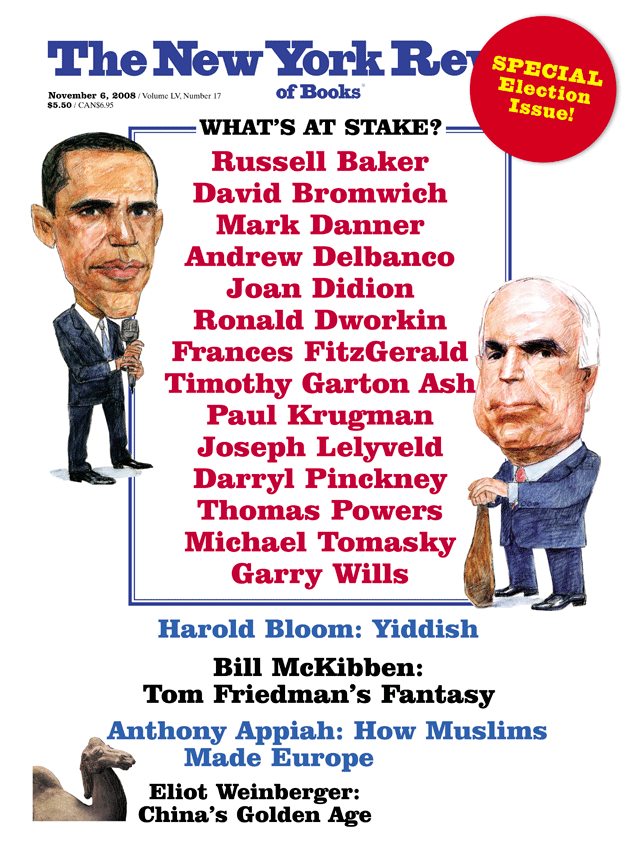
Andre Penner/AP Images
Jose Miguel Vivanco and Daniel Wilkinson of Human Rights Watch at the São Paulo, Brazil, airport, September 19, 2008. They had just been expelled from Venezuela after releasing a report in Caracas showing, as they write, that ‘President Hugo Chávez has undermined human rights guarantees’ in the country.
On September 18, we released a report in Caracas that shows how President Hugo Chávez has undermined human rights guarantees in Venezuela. That night, we returned to our hotel and found around twenty Venezuelan security agents, some armed and in military uniform, awaiting us outside our rooms. They were accompanied by a man who announced—with no apparent sense of irony—that he was a government “human rights” official and that we were being expelled from the country.
With government cameramen filming over his shoulder, the official did his best to act as if he were merely upholding the law. When we said we needed to gather our belongings, he calmly told us not to worry, his men had already entered our rooms and “packed” our bags.
But when we tried to use our cell phones to get word to our families, our colleagues, and the press, the veneer of protocol quickly gave way. Security agents surrounded us, pried the phones from our hands, and removed and pocketed the batteries. When we then insisted on contacting our embassies, they shoved us into a service elevator, took us to the basement, and forced us into the back seat of an SUV with tinted windows. When we asked where we were headed, they told us only that we were going to the airport.
Three security agents sat behind us, at least two with weapons drawn. One used a cell phone to receive and relay orders as we raced through the streets of Caracas and out onto a highway. At one point an order came to turn on the SUV’s radio so we could listen as the state news agency announced our expulsion. The announcers told their captive audience—which also included every other Venezuelan listening to the radio, since all stations are required to broadcast such messages—that our organization was funded by the US government and that we were part of a campaign of aggression against Venezuela.
Human Rights Watch does not and has never accepted funding from the US or any government, directly or indirectly. But we are accustomed to such false accusations, especially coming from authoritarian governments. Venezuelan officials have repeatedly denounced us as CIA stooges, right-wing partisans, and, more commonly, “mercenaries of the empire.” (By contrast, in neighboring Colombia, officials have repeatedly sought to discredit us with labels like Communist, guerrilla sympathizer, and even terrorist.) Once, after releasing another report in Caracas, one of us was publicly and falsely accused by Chávez’s vice-president of having collaborated with former Chilean dictator Augusto Pinochet. This time, a close Chávez ally in the legislature suggested on national TV that the two of us had been sharing a single hotel room where we were indulging our “weaknesses.”
The official reason we were given for our expulsion was that we had violated the constitution by criticizing the government while on tourist visas. It was a curious allegation since our immigration cards included a “business” box, which we had dutifully checked off. In any case, Venezuela’s foreign minister, Nicolás Maduro, made clear the next day that the government’s decision had nothing to do with our visa status. “Any foreigner who comes to criticize our country will be immediately expelled,” he declared. Of course, had the Chávez government actually been interested in upholding its laws, it would have respected our rights—enshrined in the Venezuelan constitution—to immediately contact our embassies, obtain legal counsel, and receive a fair hearing. Instead, as we discovered only after we were finally ushered onto a plane at the airport, it bought us a one-way trip to Brazil.
The ease with which the government disregarded these rights only reaffirmed the central finding of our report: the Chávez government is more than willing to violate the country’s constitution in pursuit of its own political agenda. Ironically it was Chávez himself who first championed that constitution a decade ago, after he was swept into office promising to overhaul the country’s largely discredited political system. Enacted in 1999, the “Bolivarian” Constitution offered a unique opportunity for the country to shore up the rule of law and strengthen human rights protections. But that opportunity has since been largely squandered. The most dramatic setback came in April 2002, when opponents of Chávez temporarily ousted him in a coup d’état. Fortunately, the coup lasted less than two days. Unfortunately, the government has exploited it ever since to help justify policies that have degraded the country’s democracy.
Advertisement
Today Venezuela is hardly the brutal dictatorship that some critics of Chávez paint it to be. Yet the country’s democratic institutions have suffered considerably since the coup. Chávez and his allies have effectively neutralized the judiciary. While some newspapers and broadcasters are still independent and some are outspoken in their opposition to Chávez, the President and his legislative supporters have strengthened the state’s capacity to limit free speech and created powerful incentives for self-censorship. They have, for example, expanded laws making “contempt” for government officials a criminal offense, increased prison sentences for criminal defamation, and abused the state’s control of broadcasting frequencies to intimidate and discriminate against stations with overtly critical programming. While there are independent labor unions, the government has systematically violated workers’ rights and fostered pro-government unions. There are dedicated human rights advocates. But they have been subjected to a virulent barrage of verbal assaults and even harassment by prosecutors.
A central goal of the “Bolivarian” Constitution is the promotion of a more inclusive democracy in Venezuela. In view of the history of exclusion and the glaring inequalities that plague Venezuela and countries throughout Latin America, it is a goal that deserves to be taken seriously. Yet Chávez’s own professed commitment to this vital and ambitious aim is contradicted by his government’s willful disregard for the institutional guarantees and fundamental rights that make democratic participation possible.
In the more than twenty years that Human Rights Watch has worked in Latin America, no government has ever expelled our representatives for our work, not even the right-wing dictatorships guilty of far more egregious abuses than those committed by Chávez. Presumably they knew better. After all, Chávez’s decision to expel us merely served to confirm the central message of our report and ensure that it received extensive coverage around the globe.
Why did Chávez do it? One Brazilian on the plane on which we were forced to leave Venezuela offered a view that is increasingly widespread throughout Latin America: “Chávez is crazy.” But the human rights defenders we work with in Venezuela have drawn a far more sobering conclusion. Chávez, in their view, was sending a deliberate message to his fellow countrymen: he will not allow human rights guarantees to get in his way, no matter what the rest of the world may think.
If their interpretation is right, it does not bode well for the future of Venezuelan democracy.
—October 9, 2008


